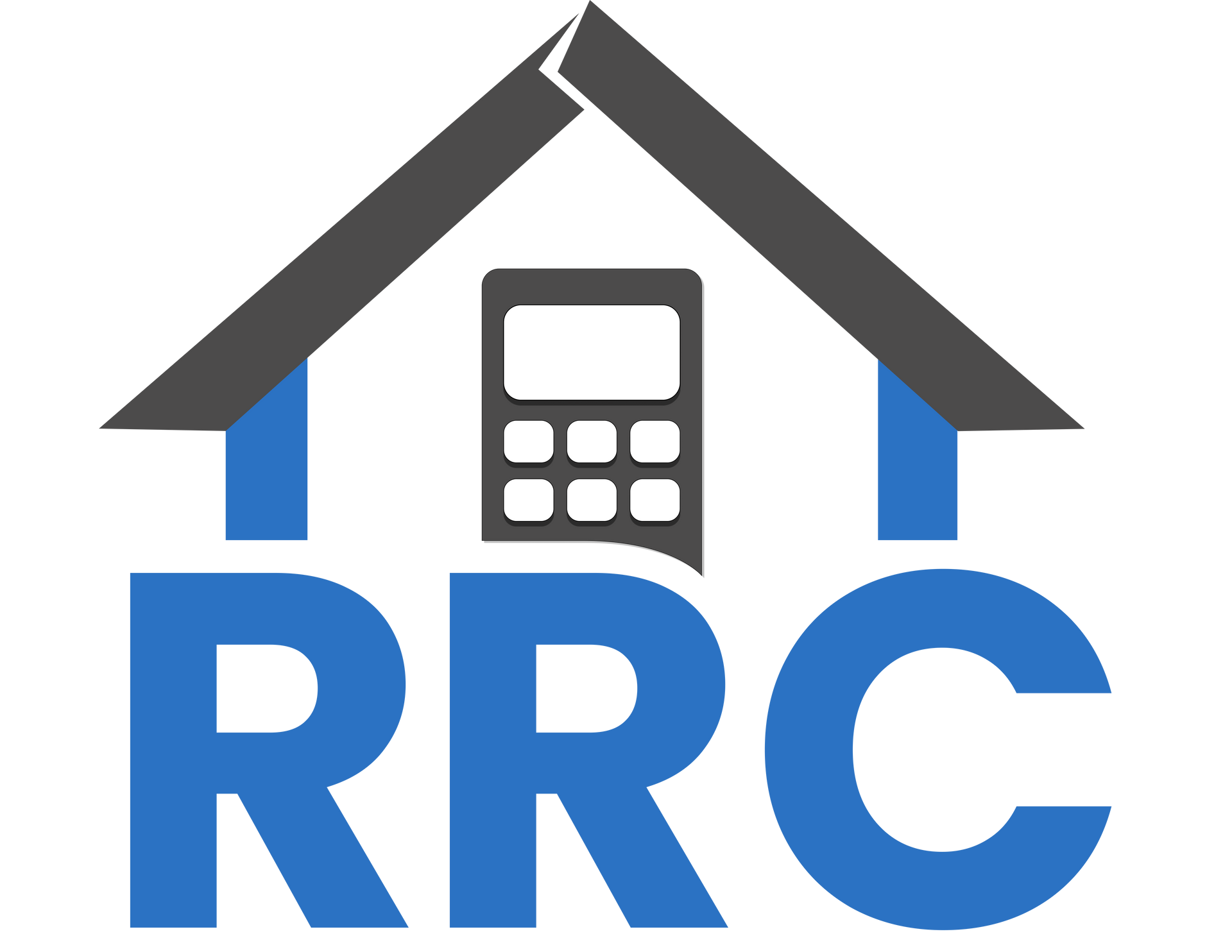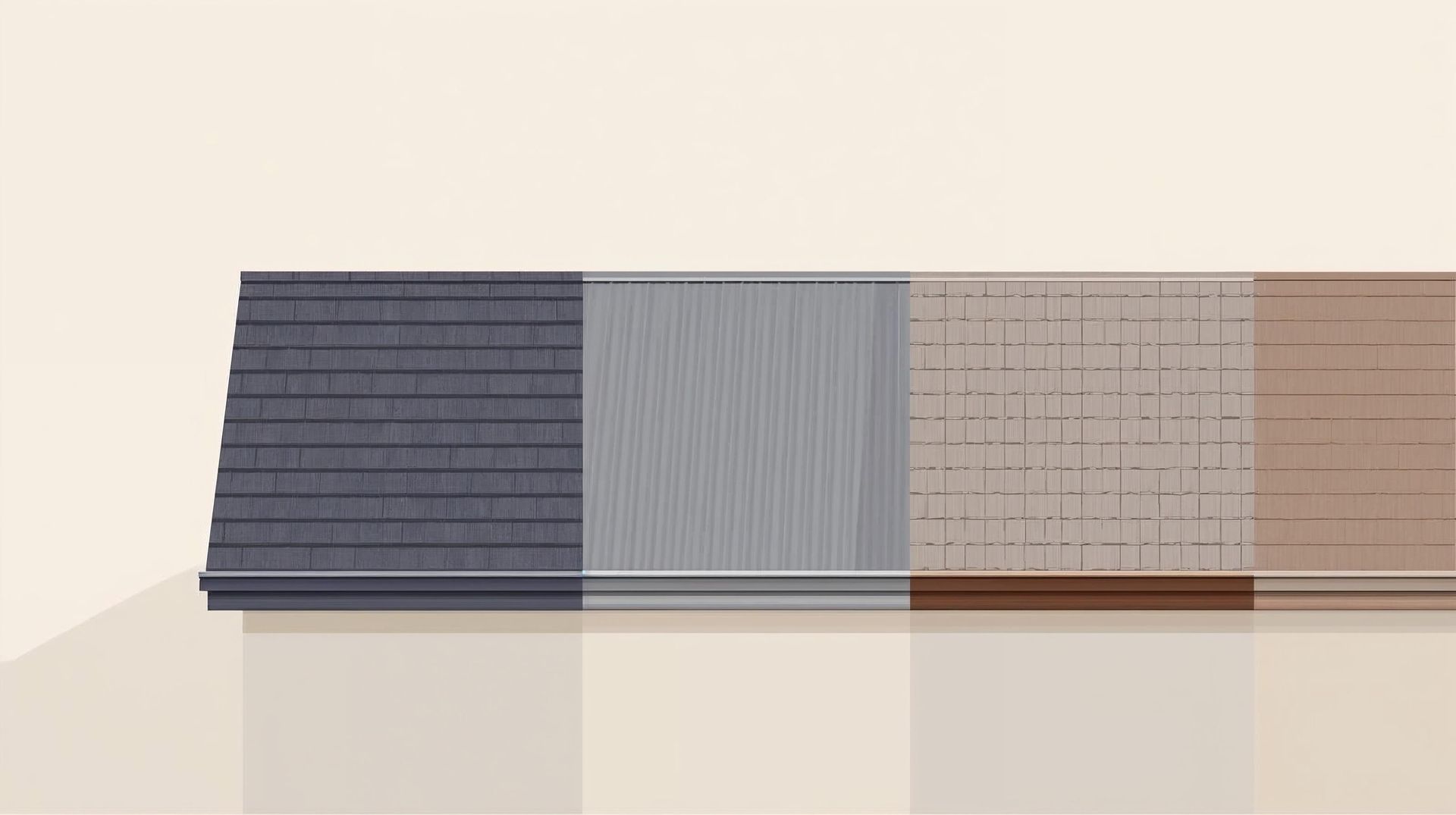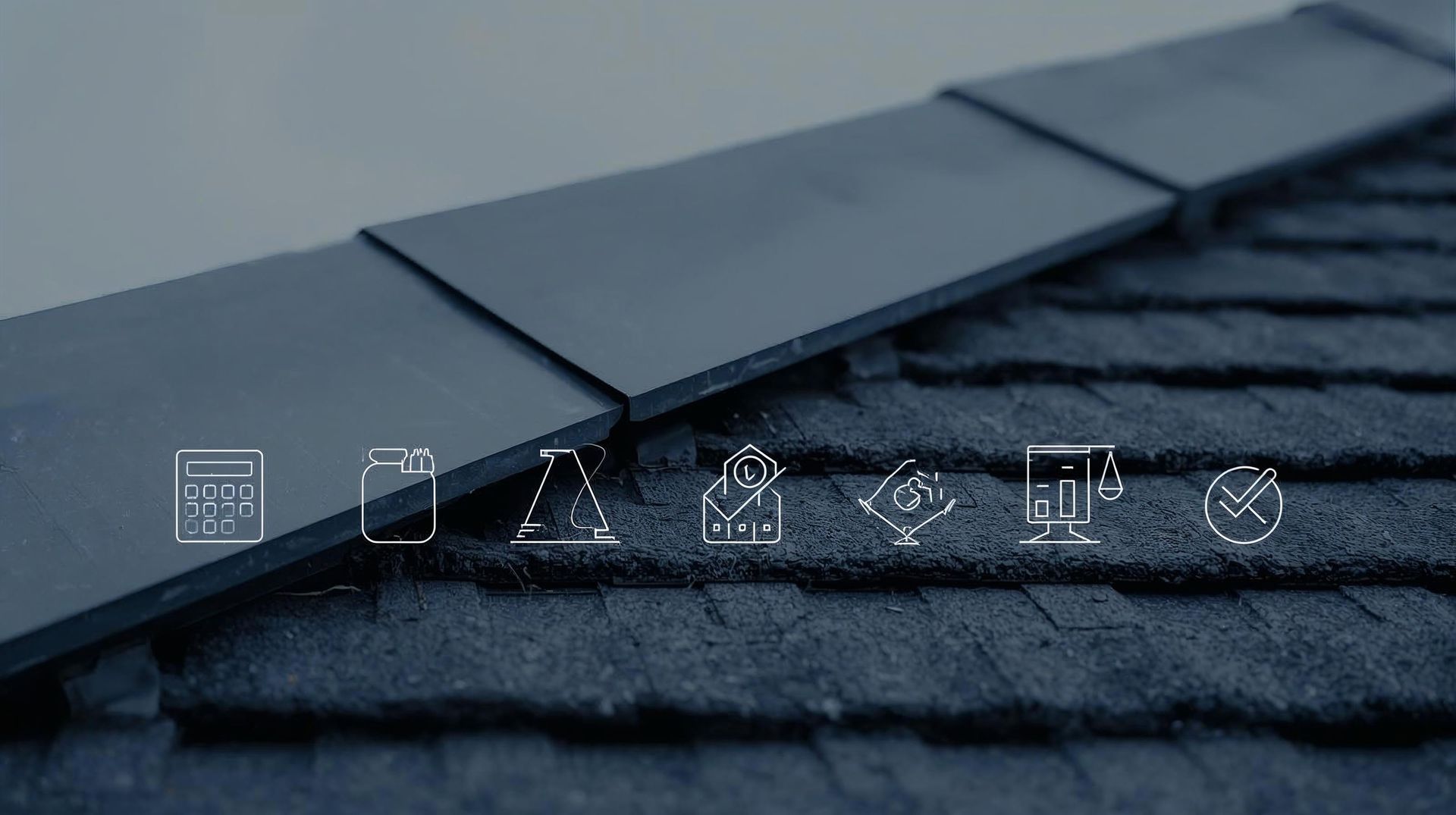How to Estimate Your Average Roof Replacement Cost Before Hiring a Contractor
Key Takeaways
- Average roof replacement cost ranges from $8,000 to $22,000, with premium materials reaching $50,000+
- Labor costs represent 40-60% of your total cost and vary significantly based on roof complexity
- Roof size, pitch, and obstacles like chimneys or skylights dramatically impact per square foot pricing
- Finding a reputable roofing
- contractor prevents costly mistakes and ensures quality workmanship
- Understanding both material and installation costs enables better budgeting and long-term savings
Start with our free roof replacement cost calculator to get instant estimates tailored to your state, roof size, and roofing material preferences.
Understanding Your Roof Replacement Project Components
Determining your roof replacement cost requires careful analysis of both materials and installation expenses.
Many believe that if asphalt shingles cost $8,000, the entire roof project will cost roughly the same. The truth is, labor costs, roof size considerations, removal of your old roof, and various fees can double or triple your total cost.
Smart planning and comprehensive cost knowledge will help you secure a high-quality new roof without financial surprises.
Material Costs: The Foundation of Your Investment
Your choice of roofing material significantly impacts your average cost, with options ranging from affordable asphalt shingles to premium slate roofs. Each square foot of material carries different price points and longevity expectations.
Popular Roofing Materials and Costs Per Square Foot:
- Asphalt shingles: $1-$5 per square foot - Most affordable option with 15-25 year lifespan
- Architectural asphalt shingles cost: $2-$6 per square foot - Enhanced durability and aesthetics
- Metal roofing: $5-$14 per square foot - Long-lasting with 40-70 year lifespan
- Clay tile roofs: $8-$20 per square foot - Excellent for hot climates, 50+ years
- Slate roofs: $10-$30 per square foot - Premium choice lasting 75-100 years
- Cedar shake roof costs: $6-$15 per square foot - Natural beauty with 30+ year lifespan
Labor Costs: The Hidden Variables
Labor expenses typically represent 40-60% of your replacement cost, varying dramatically based on roof complexity, local market rates, and seasonal demand. Roofing companies charge $40-$90 per hour per worker, with typical roof installation requiring 2-4 workers over several days.
Factors Affecting Your Labor Costs:
- Roof pitch: Steeper roofs require safety equipment and slower installation
- Roof complexity: Multiple levels, valleys, and angles increase installation time
- Old roof removal: Stripping existing materials adds significant labor expenses
- Roof size: Larger roofs benefit from economies of scale in per square foot pricing
- Additional work: Chimney repairs, gutter installation, or roof deck preparation
Also Read: How to Find a Reputable Roofing Contractor and Avoid Scams
Breaking Down Roof Replacement Cost by Project Size
Understanding how roof size impacts your total cost is crucial for accurate budgeting and contractor comparison.
Your home's square footage directly influences material quantities, labor costs, and overall project complexity, but the relationship isn't always linear.
Small Roof Projects (1,000-1,500 Square Feet)
Smaller roofs typically cost $8,000-$15,000 for standard asphalt shingles, with architectural shingles pushing costs to $12,000-$20,000. Metal roofing for the same square footage ranges from $10,000-$22,000, while premium materials can reach $25,000-$45,000.
Small Roof Cost Breakdown:
- Materials: $3,000-$8,000
- Labor costs: $4,000-$8,000
- Additional costs: $1,000-$3,000
Medium Roof Projects (1,500-2,500 Square Feet)
Medium-sized roofs represent the most common residential projects, with total costs ranging from $12,000-$35,000 depending on material choices. These projects benefit from better per square foot pricing while still maintaining manageable complexity.
Medium Roof Investment Ranges:
- Asphalt shingles: $8,000-$18,000 total cost
- Architectural shingles: $12,000-$25,000 total cost
- Metal roofing: $15,000-$35,000 total cost
- Premium materials: $25,000-$62,500 total cost
Large Roof Projects (2,500+ Square Feet)
Large roof replacement projects offer the best per square foot value but involve higher overall investment. These complex projects often include multiple roof levels, dormers, and architectural features that increase both material waste and labor expenses.
Large Project Cost Considerations:
- Best material pricing per square foot
- Complex installation requirements
- Extended project timelines
- Higher permit and inspection fees
Estimating Your Specific Roof Replacement Cost
Accurately calculating your roof replacement cost requires a systematic approach that considers your home's unique characteristics, material preferences, and local market conditions.
Step 1: Calculate Your Roof Size Accurately
Accurate square footage measurement forms the foundation of cost estimation. While your home's floor plan provides a starting point, actual roof area includes overhangs, pitch adjustments, and architectural features.
Roof Size Calculation Methods:
- Basic formula: Ground floor area × 1.15 = approximate roof square footage
- Pitch adjustments: Steeper roofs require additional multipliers
- Professional measurement: Roofing contractors provide precise calculations
Step 2: Factor in Roof Complexity Variables
Simple gable roofs cost significantly less than complex designs with dormers, valleys, and multiple roof levels. Each architectural feature adds material waste and installation complexity.
Complexity Cost Multipliers:
- Simple gable roof: Base pricing
- Hip roof design: +15-25% additional cost
- Complex multi-level: +30-50% additional cost
- Historical restoration: +75-125% additional cost
Step 3: Consider Regional Cost Variations
Your location significantly impacts both material availability and labor costs. Metropolitan areas typically command higher prices, while rural locations may face material delivery surcharges.
Regional Cost Factors:
- Local building codes requirements
- Climate-specific material needs
- Regional labor market conditions
- Material transportation costs
Also Read: The Role of Roof Ventilation: Why It’s Crucial for a Healthy Roof and Home
Roofing Material Comparison and Selection
Choosing the right roofing material represents one of the most critical decisions in your roof replacement project, directly impacting your average cost, home's curb appeal, and long-term maintenance requirements.
Asphalt Shingles: Affordable and Versatile
Standard asphalt shingles remain the most cost-effective roofing material, offering reliable protection at budget-friendly prices. Three-tab shingles cost $1-$3 per square foot, while architectural shingles range from $2-$6 per square foot.
Asphalt Shingle Advantages:
- Lowest upfront investment: Most affordable roofing material option
- Wide style variety: Numerous colors and textures available
- Easy installation: Reduces labor costs and project timeline
- Suitable roof pitch: Works on most residential roof designs
Metal Roofing: Long-Term Value Investment
Metal roofing represents an affordable metal roofing option for homeowners prioritizing longevity. While initial costs exceed asphalt shingles, the 40-70 year lifespan provides exceptional value over time.
Metal Roofing Benefits:
- Energy efficiency: Reflective surfaces reduce cooling costs
- Weather resistance: Excellent protection against extreme weather conditions
- Low maintenance: Minimal ongoing repair requirements
- Insurance discounts: Many providers offer premium reductions
Premium Materials: Ultimate Protection and Aesthetics
Clay tiles, slate roofs, and wood shingles offer superior longevity and curb appeal but require substantial upfront investment. These premium materials can last 50-100+ years with proper maintenance.
Premium Material Considerations:
- Structural requirements: Heavier materials may need roof reinforcement
- Specialized installation: Requires experienced roofing contractor's expertise
- Superior aesthetics: Significantly enhances property value
- Climate suitability: Certain materials excel in specific weather conditions
Labor Costs and Installation Complexity
Understanding labor costs represents the most crucial yet often underestimated component of your roof replacement cost, typically accounting for 40-60% of your total cost.
Understanding Roofing Contractor Pricing
Roofing companies typically structure pricing using per square foot rates, roofing squares (100 square feet), or flat project fees. Labor costs vary significantly based on local market conditions and project complexity.
Common Pricing Structures:
- Per square foot: $4-$12 including materials and labor
- Per roofing square: $400-$1,200 per 100 square feet
- Project-based pricing: Fixed cost for complete scope
Seasonal Timing Impact on Costs
Strategic project timing can significantly reduce your overall cost. Spring and fall typically offer the best balance of weather conditions and contractor availability.
Optimal Timing Strategies:
- Off-season scheduling: Late fall and early spring offer lower rates
- Avoid peak seasons: Summer and early winter command premium pricing
- Weather considerations: Plan around your region's storm seasons
- Contractor availability: Book early for preferred scheduling
Additional Costs and Hidden Expenses
Beyond the obvious roofing material and labor costs, your roof replacement project involves numerous additional costs that can significantly impact your final cost.
Permit and Inspection Fees
Most roof replacement projects require building permits and inspections, adding $100-$500 to your total cost. Local building codes may mandate specific materials or installation methods.
Old Roof Removal and Disposal
Removing your existing roof adds $1-$3 per square foot to your project cost. Some installations allow layering new materials over old roofing, but this approach may void warranties and reduce longevity.
Structural Repairs and Upgrades
Roof deck damage, inadequate ventilation, or structural issues discovered during installation can add thousands to your final cost. Budget 10-20% contingency for unexpected repairs.
Common Additional Expenses:
- Roof deck repair: $2-$7 per square foot
- Gutter replacement: $1,000-$3,000 total
- Chimney repairs: $200-$2,000 depending on scope
- Skylight installation: $500-$2,000 per unit
Also Read: Asphalt Shingles vs. Architectural Shingles: What's the Difference?
Getting Accurate Estimates from Roofing Companies
Obtaining accurate estimate quotes from roofing companies represents the most critical step in your roof replacement project, directly impacting your final cost and contractor selection success.
Obtaining Multiple Competitive Quotes
Contact at least three reputable roofing contractor firms for comprehensive estimates. Quality contractors provide detailed breakdowns including material specifications, labor costs, timeline, and warranty terms.
Essential Quote Components:
- Material specifications: Brand, grade, and quantity details
- Labor breakdown: Installation and removal costs separated
- Timeline estimates: Start date and completion schedule
- Warranty coverage: Material and workmanship protection terms
Evaluating Contractor Credentials
Your roofing contractor selection significantly impacts project success and long-term satisfaction. Verify licensing, insurance coverage, local reputation, and previous customer references.
Contractor Evaluation Criteria:
- Proper licensing: State and local permits current
- Insurance coverage: Liability and workers' compensation
- Local reputation: Better Business Bureau ratings and reviews
- Previous customers: Recent project references and photos
Financing Your Roof Replacement Project
Given that most roof replacement projects cost between $8,000-$35,000, the vast majority of homeowners require financing options to manage this significant investment.
Traditional Financing Options
Most homeowners require financing assistance for their roof replacement project. Several options offer different advantages based on your financial situation and credit profile.
Popular Financing Methods:
- Home equity loans: Lowest interest rates using home value as collateral
- Personal loans: Quick approval without collateral requirements
- Contractor financing: Convenient but potentially higher interest rates
- Insurance claims: Coverage for storm damage or covered events
Maximizing Your Investment Value
Consider strategies to optimize your roofing investment beyond basic replacement needs. Energy-efficient materials, enhanced warranties, and bundled projects can provide additional value.
Value Enhancement Opportunities:
- Energy-efficient materials: Qualify for tax credits and utility rebates
- Extended warranties: Additional protection for premium investment
- Project bundling: Combine with gutter, siding, or window work
- Quality workmanship: Invest in experienced contractors for longevity
Long-Term Value and Return on Investment
While the upfront average roof replacement cost may seem substantial, understanding the long-term financial benefits reveals why quality roofing represents one of the smartest home improvement investments.
Calculating Total Cost of Ownership
While initial investment matters, consider the complete lifecycle costs including maintenance, energy savings, and replacement frequency. Premium materials often provide better long-term value despite higher upfront costs.
Lifecycle Cost Factors:
- Material longevity: Compare expected lifespan of different options
- Maintenance requirements: Factor ongoing care and repair costs
- Energy efficiency: Calculate heating and cooling savings over time
- Insurance benefits: Consider premium reductions for durable materials
Property Value Enhancement
Quality roof replacement significantly impacts your home's market value and curb appeal. Premium materials and professional installation provide the best return on investment.
Value Enhancement Benefits:
- Curb appeal improvement: Attractive roofing enhances first impressions
- Market value increase: Quality roofing adds substantial property value
- Energy efficiency: Modern materials reduce utility costs
- Buyer confidence: New roofing eliminates concerns for potential purchasers
Maintenance and Protection of Your Investment
Protecting your substantial roof replacement cost investment requires proactive maintenance strategies that extend your new roof lifespan while preserving warranty coverage and preventing costly roof repair needs.
Preventive Maintenance Programs
Regular maintenance extends your roof's lifespan and protects your significant investment. Simple preventive measures can prevent costly repairs and premature replacement.
Essential Maintenance Tasks:
- Annual inspections: Professional assessment of condition
- Gutter cleaning: Remove debris to prevent water damage
- Minor repairs: Address missing shingles and small issues promptly
- Ventilation checks: Ensure proper airflow and moisture control
Warranty Protection and Claims
Understanding your warranty coverage protects your investment and provides recourse for defects or installation issues. Maintain documentation and follow manufacturer requirements.
Warranty Coverage Types:
- Material warranties: Manufacturer defect protection 15-50 years
- Contractor warranty: Workmanship coverage 1-10 years typically
- Extended warranties: Additional protection available for a premium cost
- Transfer provisions: Coverage continuation for new homeowners
Also Read: Your First-Timer's Guide to Roof Replacement: What to Expect from Start to Finish
Conclusion
Estimating your average roof replacement cost requires a comprehensive understanding of material options, labor expenses, and project complexity factors.
By analyzing your specific roof size, complexity, and material preferences, you can develop accurate budget expectations and make informed decisions about your roofing contractor selection.
Don't let unexpected additional costs derail your roof replacement project. Start with our free roof replacement cost calculator to get instant estimates tailored to your state, roof size, and roofing material preferences
What is the average roof replacement cost per square foot in 2025?
The average cost ranges from $4-$12 per square foot installed, depending on materials chosen. Standard asphalt shingles cost $4-$7 per square foot, while metal roofing ranges $7-$14 per square foot, and premium slate roofs can reach $15-$30 per square foot.
How does roof size affect my total replacement cost?
Larger roof areas typically reduce per square foot pricing due to economies of scale. A 1,000 square foot roof might cost $8-$12 per square foot, while a 3,000 square foot roof could average $6-$10 per square foot for the same materials.
What factors increase roofing contractor labor costs?
Steep roof pitch, complex architectural features, multiple levels, difficult access, and old roof removal all increase labor costs. These factors can add 25-75% to base installation costs depending on complexity.
Can I save money by choosing architectural asphalt shingles over premium materials?
Yes, architectural shingles offer excellent value at $2-$6 per square foot versus $10-$30+ for slate tiles or clay tiles. However, premium materials last longer and may provide better cost-effective solution over decades.
How much does it cost to remove an old roof before installation?
Old roof removal typically costs $1-$3 per square foot, depending on material type and disposal requirements. Some projects allow installation over existing materials to save money, though this may affect warranties.



